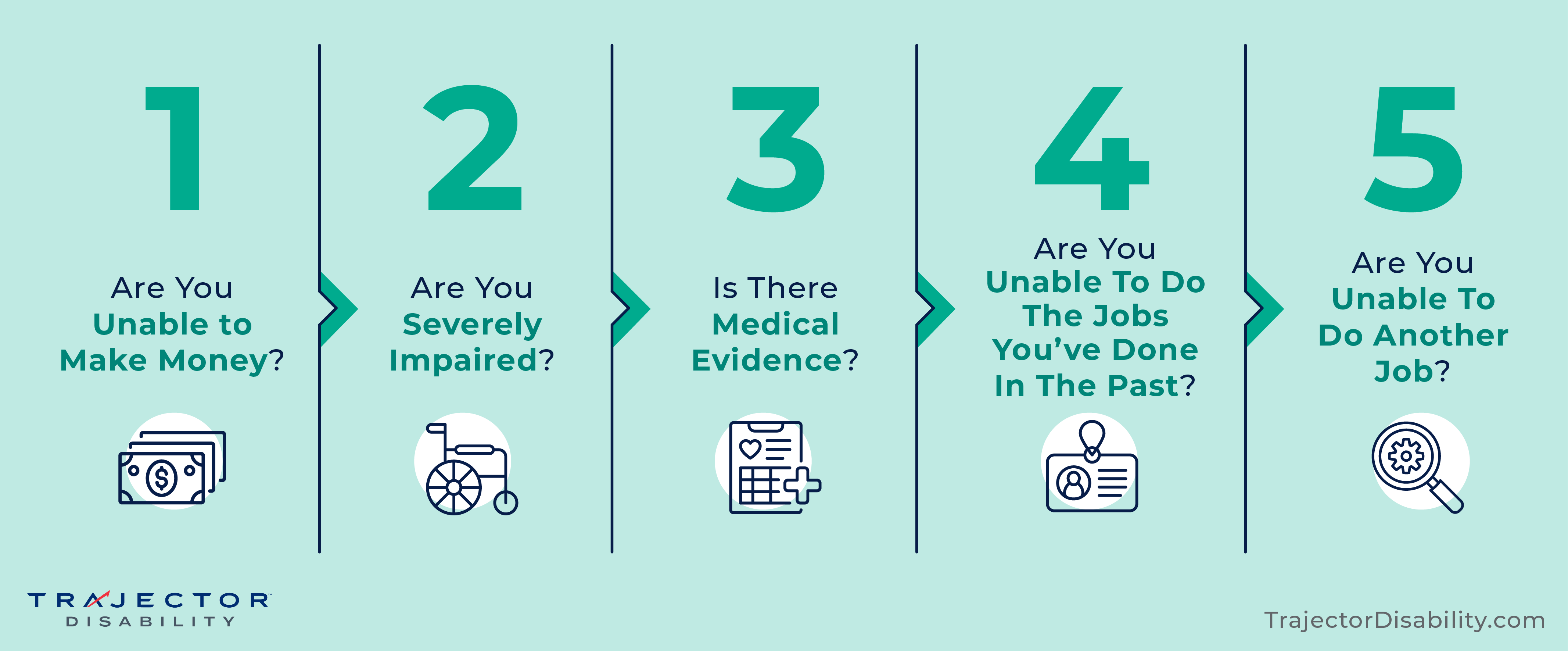SOCIAL SECURITY DISABILITY PROCESS
Am I Eligible For Disability Benefits?

1. Are You Unable To Make Money?
Does your disability keep you from earning a steady income? Your claim may be approved.
To be eligible for SSDI or SSI, we first have to show that you’re not involved in Substantial Gainful Activity, or SGA.
What is SGA?
If you have SGA, that means you’re able to make over a certain amount of money even though you have a disability.
In 2024, Substantial Gainful Activity is $1,550/month
If you are earning this amount, or higher, your claim may be denied.
In addition, to be eligible for SSI, we must show that your household income is below a certain amount.
In 2024, an individual adult seeking benefits for a minor child must earn less than $1,971 / month from a job (before taxes and deductions) or get less than $963 / month in benefits like unemployment or pensions.
Married couples who live together and are applying for SSI for a minor child must earn less than $2,915 / month and get less than $1,435 / month in benefits like unemployment or pensions.
Also, to be eligible for SSI benefits, your household assets will also be looked at.
Read more about income requirements for SSDI and SSI here: Disability Guide.
2. Are You Severely Impaired?
Your disability may be mental or physical. Within those two types, there are multiple categories.
First, determine the type and category of your disability. Then ask: How severe is it?
For a mental or physical disability to be considered severe, it must be properly diagnosed by appropriate medical providers in your medical evidence, and the disability must produce symptoms that impact your ability to do work-related activities. In other words, the symptoms need to keep you from doing your job effectively.
If the disability does not keep you from doing your job effectively, the SSA does not consider it severe impairment, and your claim may be denied.
If it does impact your work, the medical facts of your case must show that your disability meets specific requirements for your category.
3. Is There Medical Evidence?
Your disability must be well-documented. You will need any relevant X-rays, scans, tests that prove your disability.
Medical opinions from your doctors must confirm:
- Your diagnoses;
- prescribed treatment;
- the impact the disability has on your work.
If there is not enough information available, the SSA may schedule a medical exam, or consultative exam, for you.
Without the right information, good medical opinions, and proof that you’re following doctor’s orders, your claim may be denied.
4. Are You Unable To Do The Jobs You’ve Done In The Past?
To receive SSDI or SSI, the SSA requires that you show you’re unable to do any of the jobs you’ve done in the past.
The SSA will look at your “Past Relevant Work,” — that is, all jobs in your recent work history with duties and responsibilities that may be impacted by your current disability.
The Social Security Administration is reducing the time frame for “Past Relevant Work” from 15 years to 5 years – Read more here: https://www.trajectordisability.com/new-ssa-rule-reduces-work-history-requirement/.
After determining your Past Relevant Work, Social Security will determine your ”Residual Functional Capacity,” or RFC. This is what you can do on any job despite your disability.
If your RFC makes it so you can no longer do jobs like those listed in your work history, your claim may be approved, but first you’ll need to show that you would be unable to do other jobs on a full-time basis.
5. Are You Unable to Do Another Job?
If you can’t do your current job, are there another full-time jobs you can do on a competitive basis?
In other words, could you be a functional employee at another company, perhaps in another line of work, anywhere else in the U.S.?
To answer this final question, the SSA will consider your Residual Functional Capacity (as noted above), along with your age, education, skills and if changing jobs would be possible for someone in your situation.
It’s important that the SSA gets an accurate opinion of your medical condition from a doctor who knows you. Your regular treatment providers will have a deeper understanding of your disability, how the symptoms are impacting you, and what you would or would not be able to do in the workplace.
Find Out If You're Eligible
Our SSD Experts Will Lead The Way
3 Things To Remember On Your Disability Benefits Journey
1. Paperwork Is Important
To avoid fraud, the SSA requires a lot from disability claimants. Income statements, proof of identity and residences, X-rays, opinions and forms completed and signed by medical and vocational professionals.
It can be hard to manage, which is why about 25% of all initial denied claims are disqualified for technical reasons. Having someone to help you get papers in order can help you avoid denials and delays.
2. Good Medical Evidence Is Key
Once all papers are in order and the requirements have been met, an SSDI claim will be decided based on the strength of your medical evidence. That’s why it’s important to have opinions and documentation charting your disability from the early stages. Having evidence provided by doctors and specialists who know you and your disability will greatly improve your chances of approval.
3. A Denied Claim Isn't The End
If your initial claim has been denied, it’s possible that the office reviewing your claim did not fully understand or consider your disability, the evidence, or the documentation provided. That’s why there is a Reconsideration process where a higher-level office will review the initial claim and look at any new information available. If it’s denied once again, the claim can be sent to an Administrative Law Judge for a hearing that will give a fresh look at all of the information provided up that point.
HERE ARE SOME RELATED ARTICLES YOU MAY FIND INTERESTING:
- NAVIGATING CLAIMS
- 5 MINUTE READ
- 7 Minute Read
- DISABILITY BENEFITS
- 5 MINUTE READ
- 7 Minute Read
- NAVIGATING CLAIMS
- 5 MINUTE READ
- 7 Minute Read
- DISABILITY BENEFITS
- 5 MINUTE READ
- 7 Minute Read





